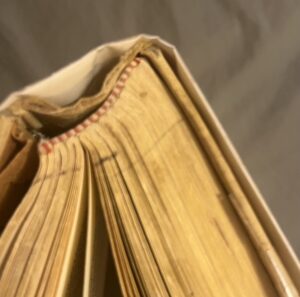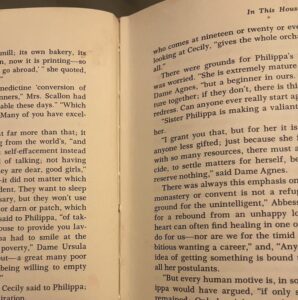Some weeks the world is so full of pain that it’s difficult to write something small and sensible.
I used to deal with such things by inviting friends to dinner. I love cooking and chatting and it was the perfect solution. In Australia right now, it’s only the perfect solution for someone who is close within the Jewish community. I am not this person, although I sued to be. That’s another story.
So many of my friends say “Sorry, too busy,” or “Next time.” Add that to my illnesses arguing with each other (a squabbling family, with no respect for their physical host) and I need a different way through. My US friends are often dealing with much worse – Australia’s antisemitism might be pretty cruel, but as long as I don’t go out much, it’s safe, and Albo is not good news but compared with the US President, he’s goodness personified. I’m caught in a strange little bind.
A friend explained that this whole thing felt pretty much like the first two years of COVID. That was my breakthrough moment. My illnesses meant that I saw no-one during COVID unless they were delivering things. Compared with that first two years, I live in a whirligig and leave my flat once a week, sometimes twice! I have friends online. And, the biggest thing of all… my TV works. During COVID I watched all the Stargate TV. I muttered when the history was so badly off. I wanted to know what Daniel Jackson’s PhDs were in and how they gave him such an ill-balanced understanding of history.
One of my many bugbears with the show was that it would have been nice to have at least maybe one or two Jews in the ancient Middle East. Stargate helped me see where some bigots get their bigotry from. If all they know about ancient history was first presented to them by Stargate or something like it, then they do not see our world, but a fictional universe.
And I’m off-topic. I was going to talk about how that COVID suggestion led to me watching much Star Trek. When I can do all my regular work, I watch less. When isolation pushes me towards cliff edges, I watch more. I argue about the world building with myself, and use the stories to help understand why we got where we are.
I always used to do this, but I’d watch or read whatever it was my writing and history students needed to know and find ways through popular TV to get them to analyse. I so miss that. But locally, no-one wants me to teach or talk anymore. This means that the thing I do best – help people understand the cultural and social basis of their own decisions – is one of the things lost unto me because I’m too Jewish and not physically robust.
The other day I emerged from hiding a little and asked people if they had more sources for what’s happening in Israel/Gaza so that I could balance out what I was learning. The main critical sources I have access to are all from pro-Israel analysts. I can (and do) pull them apart and make sense of them, but I’ve not been able to find anything nearly as solid in the analysis of data from anywhere else. Instead of giving me more sources, so that I could balance when I knew and be fair in how I see things… I lost friends. I don’t know what they saw and why my request was so impossible (they didn’t tell me), but from my end I was using my teaching methods on myself. I asked for more sources so that I could compare language and belief, look for patterns of speech, check where terms come from and how they’re used, and, above everything, when people claim this or that, drill down and find the source of the numbers and the origins of the claims, and pull them to pieces and balance them with views from other places and in other languages. Add to this checking the path ideas travel, for instance, find a translation of an article in Al Jazeera in Arabic and then compare it with the English version.
From my perspetive, anyone who makes claims about happenings at the other side of the world without doing this is doing what writers do when we world build lazily. When we world build lazily, we draw on our preconceptions of a place and time or a type of book and build up from there. This is why there is a shortage of ancient Jews in Stargate. And it’s why I’ve been accused (personally) of genocide and other things.
I can deal with the illnesses, even though they have entirely changed my everyday. I cannot deal nearly as well with people who are bright, yet will not question and try to understand how things happen, and who blame me for their own lack of thought.
I could have just said at the start of this post, “Oh, how I miss teaching!” but the reason I miss teaching is fairly important. These things are, I admit, difficult. My Richard III class at the Australian National University was both loved and hated . I got hold of such a range of primary sources for the last 3 years of his life, and the whole course comprised of students learning about the nature of the sources and pulling them apart, and then crating their own arguments on whether Richard was good, bad, a demon, a human being… whatever they wanted… as long as they could convince the rest of the class. It was an extension class, so the only result they had was their fellow students’ approval. The class felt that there wasn’t enough class time, so adjourned to coffee or dinner nearby and argued for two more hours. This is the polar opposite of conversations that cannot ever happen.
Maybe I need to return to watching TV.

 I am re-reading a book that was published in 1969 (Rumer Godden’s In This House of Brede*). As I was enjoying the things that go along with a re-read (the comfort of a known plot which allows you to sink into the characters, renewed enjoyment of the writing, discoveries of things you slid past on the first readings) I realized that I was also reminded of the way the books of my youth were made, which is different from the way they are generally made today. Lemme ‘splain.
I am re-reading a book that was published in 1969 (Rumer Godden’s In This House of Brede*). As I was enjoying the things that go along with a re-read (the comfort of a known plot which allows you to sink into the characters, renewed enjoyment of the writing, discoveries of things you slid past on the first readings) I realized that I was also reminded of the way the books of my youth were made, which is different from the way they are generally made today. Lemme ‘splain. Until the advent of paperbacks, books (almost all, at least in the Western world) were sewn. In the photo on the right you can see the stitches at about 1″ intervals. (
Until the advent of paperbacks, books (almost all, at least in the Western world) were sewn. In the photo on the right you can see the stitches at about 1″ intervals. (